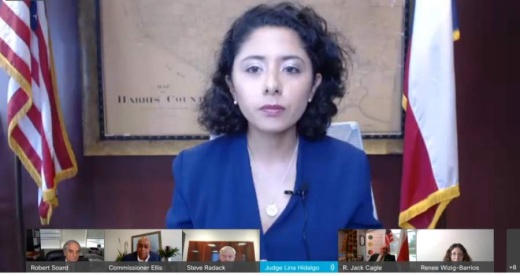A spokesperson for the Greater Houston Community Foundation confirmed today that applications for the Harris County COVID-19 Relief Fund will not open June 11, as previously stated by Precinct 2 Commissioner Adrian Garcia. According to the spokesperson, an official public application date has yet to be announced and official updates about the fund will be posted on www.harriscountyrelief.org.
Updated May 20 at 12:32 p.m.
In a post via his Facebook page, Harris County Precinct 2 Commissioner Adrian Garcia said applications for the Harris County COVID-19 Relief Fund will open June 11. Additional details about the application process are forthcoming.
Posted May 19 at 5:04 p.m.
Harris County Commissioners Court upped the funding for the Harris County COVID-19 Relief Fund from $15 million previously approved April 28 to $30 million during its May 19 meeting.
As previously reported by Community Impact Newspaper, the Harris County COVID-19 Relief Fund aims to help poor families, undocumented residents and other targeted populations pay for rent, utilities and other needs. The fund, conceptualized by Precinct 1 Commissioner Rodney Ellis, will be managed by the Greater Houston Community Foundation for an administrative fee of 5%—down from 7% as previously proposed April 28.
"The Foundation is already managing COVID-19 relief funds that have come in from the private sector and they've got the knowledge, capacity, the values and the community trust to administer this fund," Ellis said during the virtual meeting. "I think after [Hurricane] Harvey ... a little over $115 million came in and they distributed that money. We're working with the foundation because they have the capacity to ensure that these dollars reach the people who need it the most throughout the entire county and they can do it quickly."
The funds will be administered in two rounds through a randomized process as opposed to a first-come, first-served basis, which Ellis said will ensure equity in the distribution. The GHCF will use its network of more than 100 community-based nonprofits to help identify potential applicants and will also take on marketing and outreach—including targeted text messages in multiple languages—to communicate eligibility requirements and application instructions.
Renee Wizig-Barrios, senior vice president and chief philanthropy officer for the foundation, agreed that a first-come, first served system would not be ideal.
"We believe it's really fundamentally important that if you're going to use an equity lens, this really should be a process that is more complex that just opening up a phone line or a website and allowing everyone to apply at the same time," she said during the meeting. "While that may seem easier, we don't believe that is really the effective way to reach the most vulnerable, and thus we've spent a lot of time developing a process that really is taking into account the social vulnerability index."
A date and time for application has not been announced as of May 19, Ellis said.
Eligible applicants for the fund include Harris County residents who have experienced adverse effects related to COVID-19 and fall below 60% of the area median income, are victims of domestic violence, have aged out of foster care or are currently living in homeless shelters, Ellis said. Applicants cannot have received benefits from any city of Houston or other Harris County program administered for the same purpose, he added.
"Any Harris County resident who meets the financial need criteria can apply," Ellis said. "This fund will assist residents to pay for their top needs, whether it's rent, food, medical care, child care or other costs. Just like the [Coronavirus Aid, Relief, and Economic Stability] Act, we want to make sure we get resources to our residents as quickly as possible and in two stages to disperse these funds."
The $30 million is expected to assist anywhere from 20,000-25,000 families. Those who are selected for funding will receive a one-time allotment of $1,200 or $1,500, depending on the applicant's household size, Ellis said.
"$30 million is a big sum but this is a big problem ... probably on par with the Great Depression," Ellis said. "It's not enough money to solve all of the pain that has been caused by COVID-19, [which has] essentially put our economy into a coma ... but it's important to start somewhere."
The $30 million fund was approved in a 3-2 vote with Precincts 3 and 4 Commissioners Steve Radack and Jack Cagle dissenting. The vote also authorized the county to enter into a contract with the Greater Houston Community Foundation to manage the fund, which will be funded through the county's Public Improvement Contingency Funding, also known as the rainy day fund.
Cagle previously said he supported using philanthropic or federal money for a COVID-19 relief fund, but was against using rainy day funds, which are raised from property taxes.
On May 19, Radack said he was voting no, among other reasons, because he did not think the county would be able to use federal relief funds to reimburse the $30 million.





